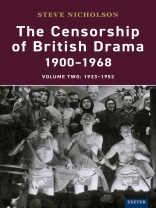This is the second volume in a new paperback edition of Steve Nicholson’s well-reviewed four-volume analysis of British theatre censorship from 1900-1968, based on previously undocumented material in the Lord Chamberlain’s Correspondence Archives in the British Library and the Royal Archives at Windsor. It covers the period from 1933 to 1952, and focuses on theatre censorship during the period before the outbreak of the Second World War, during the war itself, and in the immediate post-war period. The focus is primarily on political and moral censorship. The book documents and analyses the control exercised by the Lord Chamberlain. It also reviews the pressures exerted on him and on the theatre by the government, the monarch, the Church, foreign embassies and by influential public figures and organisations.
This new edition includes a contextualising timeline for those readers who are unfamiliar with the period, and a new preface.
DOI: https://doi.org/10.47788/SGLU9228
Inhaltsverzeichnis
Acknowledgements
Introduction: ‚The Most Dispensable of All the Fetters‘
Section One: 1933-1939
1 ‚Verboten‘: The Nazis Onstage
2 ‚Prudes on the Prowl‘: The Moral Gaze
3 ‚The Author Will Probably Deny It…‘: Naming the Homosexual
4 ‚These Communist Effusions‘: Testing Tolerance in Politics and Religion
Section Two: 1939-1945
5 ‚Everybody Bombs Babies Now‘: Politics in Wartime
6 ‚Lubricating the War Machine‘: The Nude in Wartime
7 ‚Beastly Practices‘: Sexual Taboos in Wartime
Section Three: 1945-1952
8 ‚Two Ways To Get Rid Of The Censor‘
9 ‚This Infernal Business of Sex‘
10 ‚But Perverts Must Go Somewhere in the Evening‘
11 ‚The Crazy but Satisfactory Ethics of the English‘
Afterword: ‚Congenial Work‘
Notes on Archive Referencing and Authors‘ Names
Notes
Select Bibliography
Index
Über den Autor
Steve Nicholson is Emeritus Professor at the University of Sheffield. He is a series editor for Exeter Performance Studies and the author of British Theatre and the Red Peril: The Portrayal of Communism, 1917-1945, also published by UEP.












